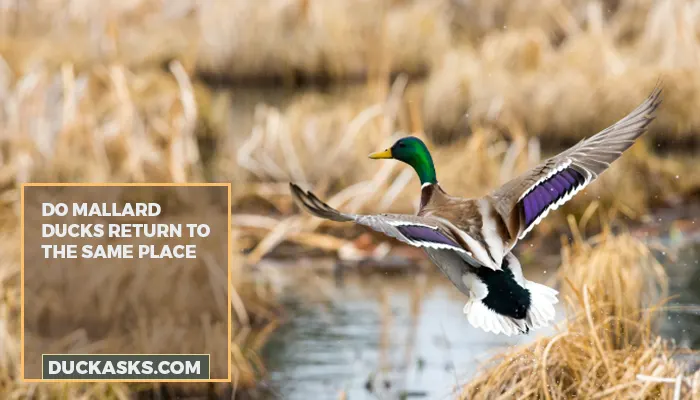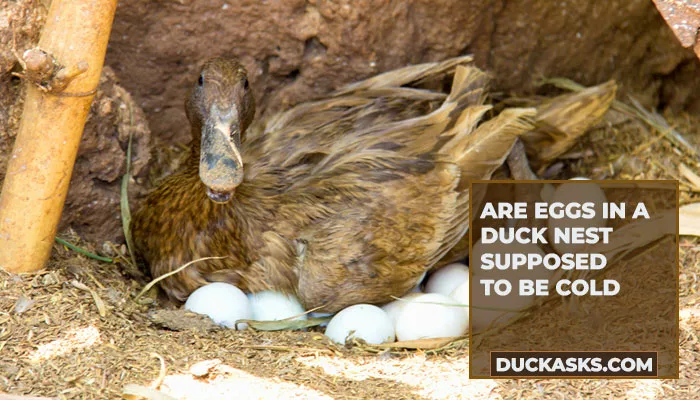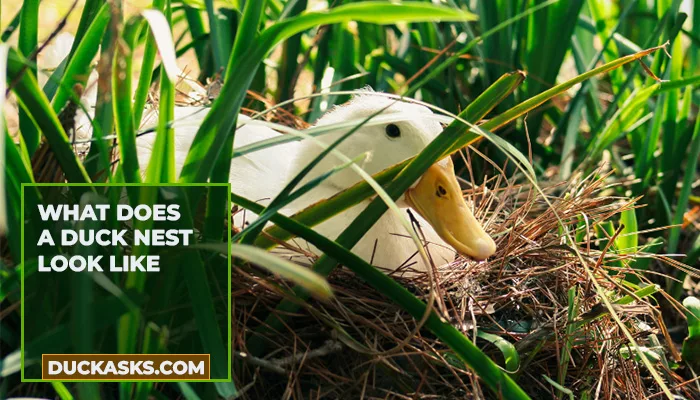Where Do Wild Ducks Sleep?
Ducks, wild ducks – call them what you like; they are equally at home on land or in water. However, their sleeping position leaves a lot of room for confusion.
Most ducks drift off to sleep on water, thanks to being members of the Anatidae family, but where do wild ducks sleep?
Wild ducks such as Mallards and Mandarins can go to sleep in the water, although land is their preferred place for sleeping.
In the article, we describe wild ducks’ sleeping locations in detail. We will also explore their sleeping posture, habits, and whether or not they sleep alone.
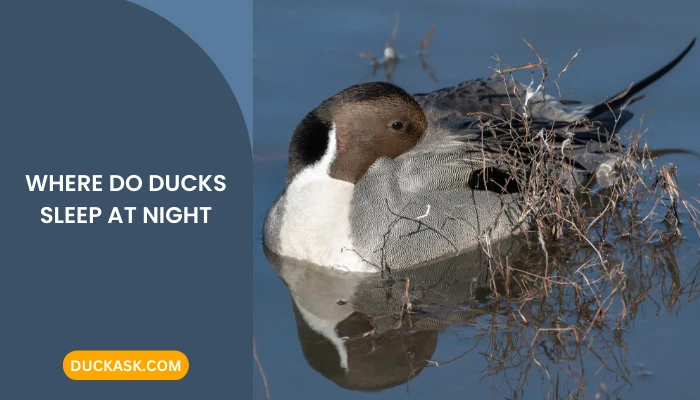
Want to learn more about ducks habitat:
Where Do Wild Ducks Typically Sleep at Night?
Wild ducks, especially the popular Mallards and Muscovies, typically lay down on land to sleep. They perch their colorful feathers amid green grass and cozy foliage.
They’re quite the social bunch too! These adorable avian birds love to huddle together with their pals. It’s like a slumber party, but not just for fun. They stay safe together, watching for any potential trouble.
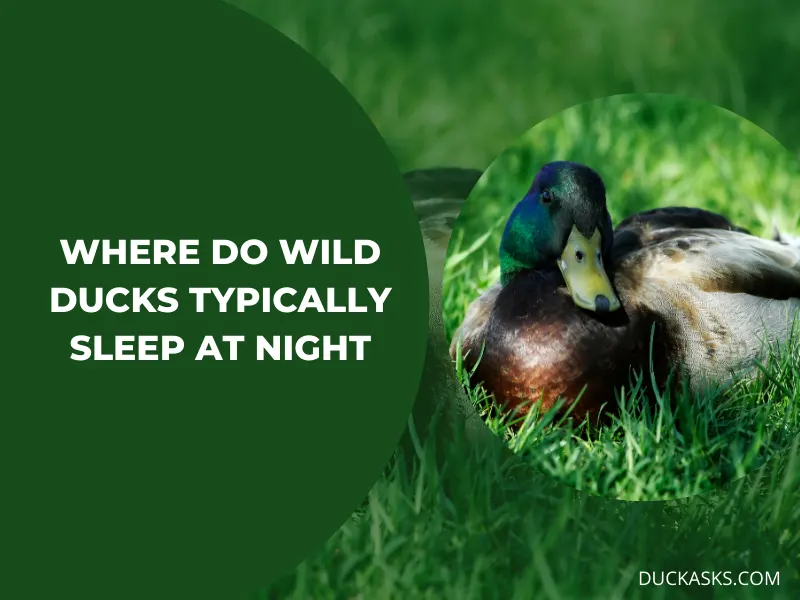
Do Wild Ducks Sleep on Land or in the Water?
Being a part of the Anatidae, ducks are naturally drawn to water, and their choice of sleeping habitat reflects that.
Ducks prefer to drift off into slumber while resting on the tranquil surface of calm or still waters. This ensures they are not subject to strong currents, giving them a sense of security.
However, surprisingly enough, some species, especially Eiders, even sleep in the open ocean. Perhaps a question is pounding on your head, are wild ducks more likely to sleep in water or on land? The situation is entirely different for wild ducks. Some of them, including Mallards and Muscovies, are more comfortable sleeping on terra firma.
Do Wild Ducks Sleep in Groups or Alone?
Similarly to humans, wild ducks feel most at ease when a bunch of friends surround them. Thus, instead of slumbering alone in danger, they choose to sleep in groups.
During the day, they’re out and about, exploring the grassy lands or swimming through shallow waters in search of food. There’s a term for it: paddling. As soon as night falls and it’s time for a well-deserved rest, they snuggle up with their paddling mates for a good night’s sleep.
Now let’s discuss sleep schedules. What is the typical sleep pattern of wild ducks? Some wild ducks are semi-nocturnal, meaning they can be active at night. But here’s the catch – they don’t have fixed schedules.
They sleep whenever they feel like it, whether day or night – flexible sleepers, you could say!
One clever thing about wild ducks is that many of them hunt overnight. It’s probably because they feel safer and more alert during the quieter nighttime hours.
As for daytime, some ducks nap more, likely because predators tend to be more visible in daylight.
How Do Wild Ducks Sleep?
When wild ducks settle down for sleep, their posture is quite charming. These birds nestle their bills snugly in their soft feathers. Moreover, they tend to nap with their heads bent backward.
One of the most endearing sights in the world is watching ducks sleep on just one leg, nonchalantly balancing on it like a seasoned pro. Mallards are particularly fond of this one-legged sleeping style.
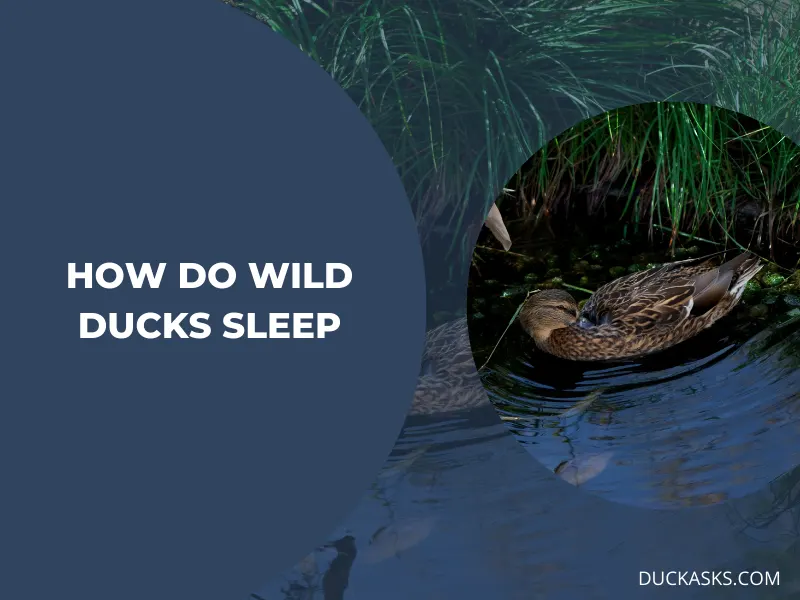
It demonstrates their remarkable adaptability and ability to find comfort even in the most peculiar positions.
Do Different Species of Wild Ducks Have Different Sleeping Habits? Ducks may have different sleeping habits depending on their species. Mallards, those charming wild ducks we often see in ponds and lakes, sleep on land most of the time.
On the other hand, wood ducks have distinct preferences regarding bedtime. These beauties enjoy snoozing on the shimmering surface of the water.
What About Ducks on a Farm? Farm ducks aren’t picky about what they sleep on. You can put soft straws or shavings in the coop, and they will still be content to sleep there.
How Do Wild Ducks Protect Themselves while Sleeping?
Unlike most animals, ducks aren’t fussy about where they sleep. Does that mean they do not have protection while sleeping? Are ducks not concerned that wild animals could swallow them whole?
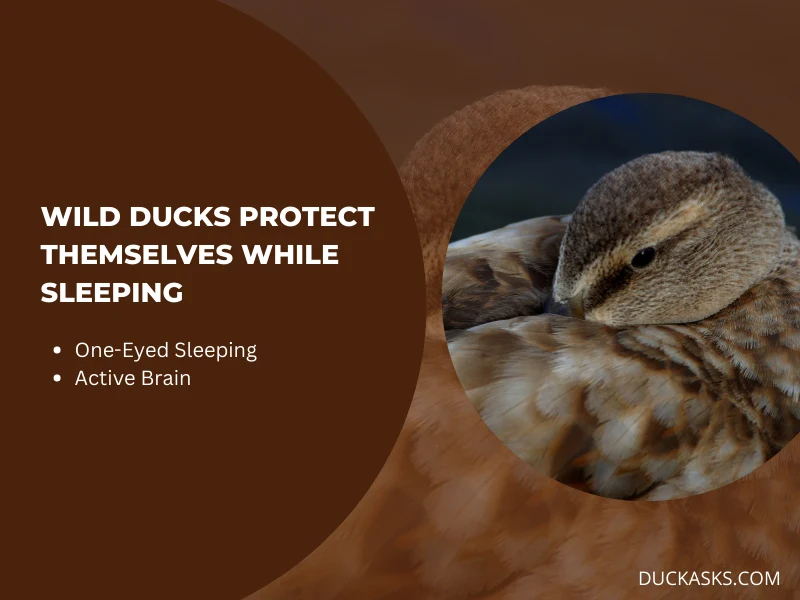
They definitely are. This is exactly why ducks use a few tricks while sleeping, including –
One-Eyed Sleeping
In case you didn’t know, wild ducks love to sleep in groups. They even line up in rows during large gatherings.
Toward the ends of the row, you will spot a few sleeping lightly, or more precisely, one of their eyes wide open. This keeps the birds on the lookout for unforeseen movements.
What about the ducks in the middle? Well, these are the lucky ones snoozing in the lap of luxury as their assigned guards watch over them.
Active Brain
Wild ducks may still fail to anticipate predators when they have one eye open. This is where one of their coolest abilities shines.
A duck is capable of sleeping with half its brain functioning. Through the combined use of one eye and a single hemisphere, they defend themselves at night.
Once again, the birds at the ends of rows demonstrate this ability. The ones in the middle continue to sleep, although they switch positions to ensure everyone gets adequate rest.
Where Do Baby Ducks Sleep?
Baby ducks, also known as ducklings, sleep floating on water or even on land, wherever their watchful mothers lead them. The warm, protective wings of their mother wrap them in a gentle embrace.

Why the close cuddles, you ask? These tiny cuties rely on external heat sources to stay toasty. And who better to provide that soothing warmth than their loving mother?
No matter the breed, baby ducks stick close to their parental figures for approximately two months. It not only safeguards them from predators but also fosters family bonds.
Frequently Asked Questions
1. How long do Wild ducks sleep at night?
Wild ducks sleep for longer periods compared to many other bird species. Based on reliable sources, they can sleep for an average of 10.8 hours a day.
2. Where do wild ducks sleep in the winter?
Migratory wild ducks, which travel to different regions during the winter to escape colder climates, roost in large flocks on their wintering grounds. It allows them to conserve body heat when it gets chilly. On the other hand, non-migratory ducks, also known as resident ducks, often congregate under shrubs and bushes to stay warm.
3. Do wild ducks sleep while flying?
Wild ducks can sleep while flying since they are able to use half of their brains while sleeping with the other half. It is known as slow-wave sleep in a single hemisphere.
Conclusion
The fact that most ducks sleep in water does not necessarily mean wild ducks do the same. They feel more at ease on land, despite their ability to float in the water and sleep.
So, the next time you wonder where do wild ducks sleep, know that these charismatic creatures have developed a knack for finding comfortable spots on land to rest before the day’s adventures.
References:
- https://www.ducks.org/conservation/waterfowl-research-science/ducks-after-dark
- https://www.rspb.org.uk/birds-and-wildlife/advice/how-you-can-help-birds/where-do-ducks-nest/
Image Credit:
- Canva.com/photos



